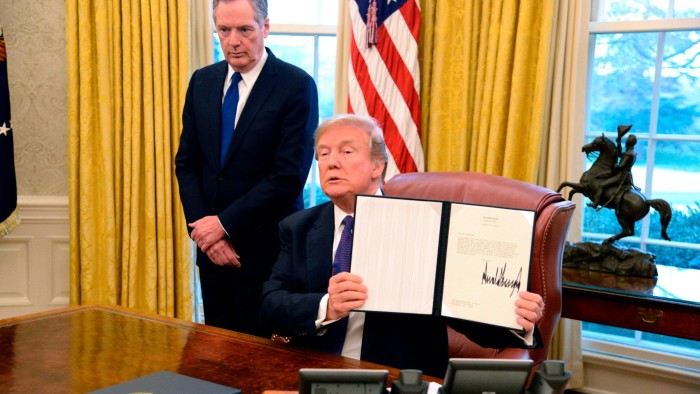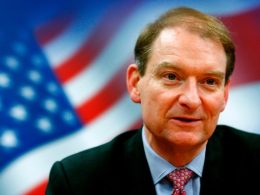Unlock the White House Watch newsletter for free
Your guide to what the 2024 US election means for Washington and the world
The writer is chief economist at ING
Donald Trump’s resounding victory has upset conventional economists almost as much as American liberals. The Republican candidate’s pledge to implement trade tariffs and other protectionist measures has provoked a spate of dire economic prognostications. But much of the current doom-mongery doesn’t consider mitigating factors — and risks undermining the credibility of globalisation’s defenders.
These are difficult times for economic experts. Politicians hardly seem to take their advice seriously any more. Economists continue to warn about the dangers of deglobalisation in the form of higher prices and less GDP growth but electorates are rolling their eyes. Trump’s victory amplifies this trend.
Some economists estimate that “blanket” tariffs on all imported goods will add up to a big hit to the global economy, leaving American and European households worse off. For example, the Peterson Institute for International Economics estimates that tariffs will add more than $2,600 in annual costs to the typical US household. The prestigious Wharton school at the University of Pennsylvania warns a trade war “could reduce GDP by as much as 5 per cent over the next two decades”. Not to be outdone, the IMF estimates US GDP will be 1.6 per cent lower by 2026 as a consequence of Trump-like policies.
However, there are a couple of problems in general with forecasting the impact of tariff rises. First, some forecasts do not always place enough emphasis on likely mitigants, or the economic mechanisms that will soften the blow. For example, a stronger dollar would lower the inflationary impact of tariffs in the US, by reducing the effective price of imports of good and services priced in euros or pounds. Corporates will certainly adapt and find ways to cushion the blow — rerouting the trade via other countries, adding more value in the US rather than at home — and economic simulations usually underestimate these. Also, monetary policy will help out. In Europe, for example, the European Central Bank could lower interest rates.
Second, Trump has also promised economically supportive policies, such as deregulating the energy sector, which could help cut prices, and also low taxes, which would support net income.
In addition, there is a big but well-known question mark over the extent to which tariffs will be implemented. Trump is a dealmaker; ergo, it seems reasonable to assume he will make deals. And, judging from his last administration, American corporates might be able to convince the president-elect of the negative impacts on their businesses given a huge share of imports are intra-company.
Economists’ forecasts sometimes sound worse to the average consumer than they probably are. For example, Wharton’s estimated 5 per cent GDP hit would occur over two decades; that hardly constitutes a crisis. Similarly, the IMF’s 1.6 per cent GDP decrease over two years is substantial, but not enough to constitute a meaningful recession in itself.
Tellingly, the IMF does not expect Trump’s proposals to lead to significant inflation, but that has not been given much attention. And even the direst economic conjecture has not yet forecast price increases similar to those seen recently, particularly in energy and food. In sum, the shock effect of proposed tariffs are pretty slight compared with the economic stress that consumers and corporates have experienced over the past few years.
To be sure, economists are not wrong to say protectionism comes with a hefty price. But, much like Brexit, the damage done by tariffs specifically and deglobalisation generally is likely to be slow and cumulative. There are multiple downsides to presenting it as a shock. First, it reduces fragile confidence and thus businesses and consumers may refrain from investing or shopping, hitting growth more than necessary. Second, governments may rush to policies and compromises that are overdone, such as concessions in a trade deal or tit-for-tat protectionism.
Third, it could slow momentum for much-needed European economic integration, including capital markets and banking unions, as politicians wait for a crisis that will never come before starting their negotiations. Finally, voters will see overly pessimistic warnings on inflation and other economic damage as yet another reason not to listen to experts.
The consequences of deglobalisation will show up in the slow erosion of long-term productivity and economic wellbeing. It will leave us all poorer in the long-run. That’s less catchy — but a crucial defence of why it matters. Overly gloomy warnings of a Trump shock risk weakening crucial support for globalisation and open trade even more.
Source link









